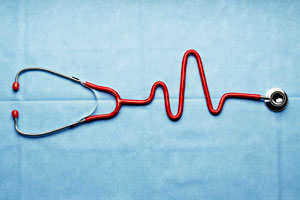Arrhythmia is an irregular heartbeat caused by abnormal electrical impulses in the heart. Scary as it sounds—heart beating too slowly, too quickly, or skipping a beat—arrhythmia is not uncommon and often harmless. Some arrhythmias, however, can increase the risk of stroke, blood clots, and cardiac arrest, and are more serious for those with heart failure or heart disease. Arrhythmia symptoms can include dizziness, lightheadedness, or shortness of breath.
What Causes Arrhythmia?
The heart doesn't contract all at once. Instead, each section waits for its cue: an electrical signal that starts at the top of the right atrium and runs downward through the ventricles. As long as nothing disturbs that signal, the heart will beat at a mostly steady, healthy pace.
Damage to the heart—whether from an infection, an inherited condition, or a heart attack—can interfere with the electrical signal and throw the heart off its rhythm. This is arrythmia.
Damage to the heart—whether from an infection, an inherited condition, or a heart attack—can interfere with the electrical signal and throw the heart off its rhythm. This is arrythmia.
Almost any part of the heart is capable of starting the electricity that drives the beat, and the heart muscle may also immediately jury-rig a new source of electrical signals. These new signals may keep the heart beating, but they disrupt the normal pace or rhythm.
A racing heartbeat—ventricular tachycardia, it turns out—sent Shannon Schroeder, 37, of Poulsbo, Wash., to the emergency room. It's a good thing she went.
A racing heartbeat—ventricular tachycardia, it turns out—sent Shannon Schroeder, 37, of Poulsbo, Wash., to the emergency room. It's a good thing she went.
An echocardiogram showed that the walls of her left ventricle were thicker than they should be, and the muscle showed telltale damage of an earlier silent heart attack. The damage had weakened her heart and harmed the electric circuitry that maintains a normal rhythm.
Stimulants—including caffeine, nicotine, and drugs—can also cause brief arrhythmias. They're usually harmless, but there are case reports of people dying from ventricular fibrillation after overdosing on controlled substances.
Stimulants—including caffeine, nicotine, and drugs—can also cause brief arrhythmias. They're usually harmless, but there are case reports of people dying from ventricular fibrillation after overdosing on controlled substances.
7 Symptoms of Arrhythmia
Here are signs you must see a doctor: If strange heartbeats are accompanied by other symptoms of heart trouble, including fainting or near-fainting, breathlessness, or chest pain. Or if your arrhythmia lasts longer than 30 seconds. Also if you're a heart attack survivor or if you have heart failure, any change in rhythm is cause to seek medical help.
Read on for possible symptoms of a common type of arrhythmia, atrial fibrillation (a racing, irregular heartbeat). For symptoms of another type of arrhythmia, bradycardia (a slower than normal heartbeat), visit our A-Z Health Library.
How Medications Treat Arrhythmia
Treating an arrhythmia with medication is like putting out a campfire with a squirt gun. Drugs can control abnormal heartbeats and the fainting, light-headedness, and breathlessness that can go along with them, but they merely dent the problem, says Dan Roden, MD, a professor of medicine at the Vanderbilt University School of Medicine. "Medications don't work as well as we'd like, and many have side effects ranging from fatigue to organ damage," he says.
Still, some of the medications are used to manage arrhythmia. Here's an overview.
- Blood thinners such as Coumadin can help prevent the blood clots that result from atrial fibrillation.
- Anti-arrhythmic drugs such as Betapace and Cordarone can encourage a normal rhythm in the heart. Unfortunately Cordarone may cause many side effects ranging from fatigue to uncontrollable tremor to liver and lung disease. Doctors typically don't prescribe it unless other medications have failed.
- Beta-blockers such as Coreg and Lopressor can slow the heart rate in patients with atrial fibrillation.
- Calcium channel blockers such as Cardizem and Norvasc also help slow the rate and are especially effective for treating tachycardias.
 6:37 AM
6:37 AM
 Better Health
Better Health


